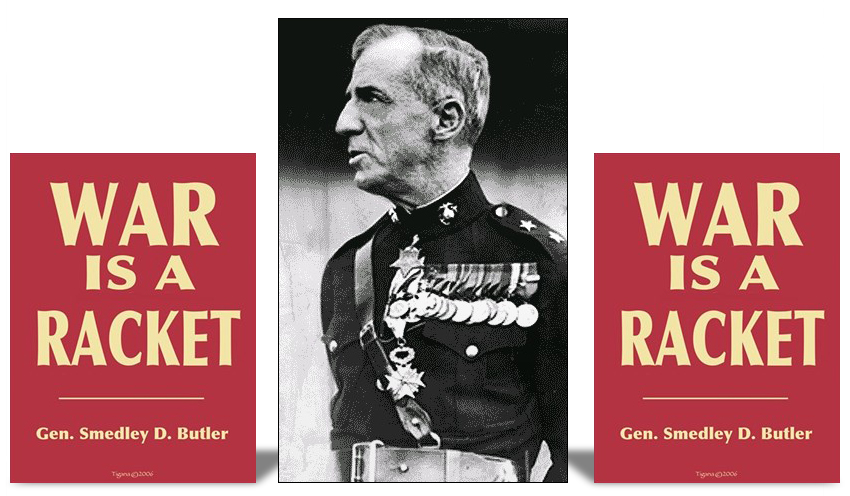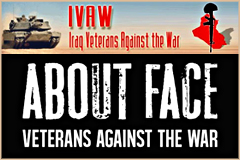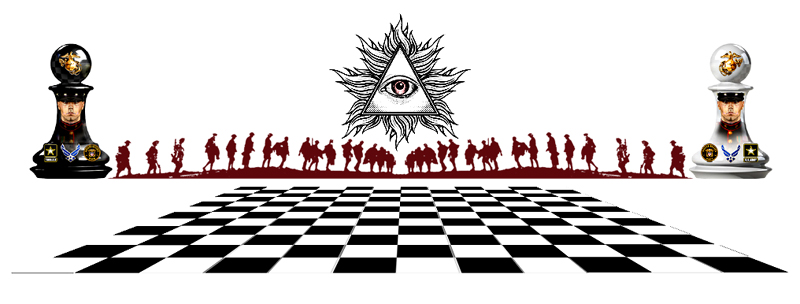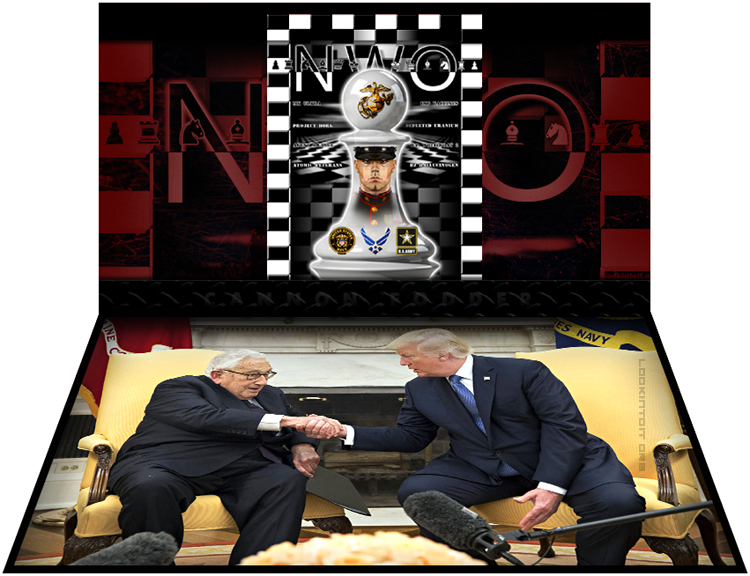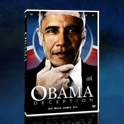welcome
|
|||||||||||||||||||||||||
______WAR______ These 127 essays, although organized under seven headings, have one underlying theme: opposition
to the warfare state that robs us of our liberty, our money, and in some cases our life. Conservatives who decry
the welfare state while supporting the warfare state are terribly inconsistent. The two are inseparable.
Libertarians who are opposed to war on principle, but support the state’s bogus “war on terrorism,” even as they
remain silent about the U.S. global empire, are likewise contradictory. In chapter 1, “War and Peace,” the evils of war and warmongers and the benefits of peace are examined. In chapter 2, “The Military,” the evils of standing armies and militarism are discussed, including a critical look at the U.S. military. In chapter 3, “The War in Iraq,” the wickedness of the Iraq War is exposed. In chapter 4, “World War II,” the “good war” is shown to be not so good after all. In chapter 5, “Other Wars,” the evils of war and the warfare state are chronicled in specific wars: the Crimean War (1854–1856), the Russo-Japanese War (1904–1905), World War I (1914–1918), the Persian Gulf War (1990–1991), and the war in Afghanistan (2001–). In chapter 6, “The U.S. Global Empire,” the beginnings, growth, extent, nature, and consequences of the U.S. empire of bases and troops are revealed and critiqued. In chapter 7, “U.S. Foreign Policy,” the belligerence, recklessness, and follies of U.S. foreign policy are laid bare. Chapter One - War and Peace ______[p1]
Listen to "Christianity and WAR" on Spreaker.
WAR
Marines, Why Do You Do This to Your
Families?
From September 27, 2010, to April 11, 2011, the approximately 1,000 Marines of the 3rd Battalion, 5th Regiment,
based at Camp Pendleton, and known as the “Darkhorse” Battalion, suffered the loss of 25 men in the Sangin district
of Helmand province in Afghanistan in support of Operation Enduring Freedom. An estimated 470 enemy fighters were
killed. A favorable ratio to be sure, but still 495 deaths too many. Beginning this past October 30 and ending on
November 5, NPR Pentagon correspondent Tom Bowman did a seven-part series for All Things Considered on the
Darkhorse Battalion called “u2018Darkhorse’ Battalion and the Afghan War.” Here is how the series was introduced: A
year ago, nearly 1,000 U.S. Marine officers and enlisted men of the 3rd Battalion, 5th Regiment deployed to restive
Helmand province in southern Afghanistan. By the time their tour ended in April 2011, the Marines of the 3/5 –
known as “Darkhorse” – suffered the highest casualty rate of any Marine unit during the past 10 years of war. This
week, NPR tells the story of this unit’s seven long months at war – both in Afghanistan and back home. Disgust,
anger, sorrow, pity – this is how I felt after listening to some of the shows in the series. I recently listened to
the whole series as well as a 50-minute
version. A timeline of the deadly Afghan mission is online here. The seven
shows with their descriptions as provided by NPR are as follows: “Afghan Success Carries A
Price For Commander,” October 30 In Afghanistan, Lt. Col. Jason Morris led the 3rd Battalion, 5th Regiment,
which suffered the highest casualty rate of any Marine unit during the past 10 years of war. The “Darkhorse
Battalion” commander says the unit’s mission was a success – but he will live with the burden of those deaths.
Nov. 24, 2010: Lance Cpl. Arden Buenagua Nov. 25, 2010: 1st Lt. William Donnelly Dec. 2, 2010: Sgt. Matthew Abbate Dec. 6, 2010: Cpl. Derek Wyatt and Pfc. Colton Rusk Dec. 7, 2010: Sgt. Jason Peto Dec. 17, 2010: Lance Cpl. Jose Maldonado Dec. 24, 2010: Lance Cpl. Kenneth Corzine Dec. 28, 2010: Cpl. Tevan Nguyen Jan. 20, 2011: Sgt. Jason Amores In addition to the 25 Marines that died in Helmand province, there were 184 that were badly wounded, including 34 that lost limbs. But I want to focus, not on what the Marines of the Darkhorse Battalion endured in Afghanistan, but on what they did to their families back home. In case you don’t have the time to listen, here are some excerpts from the NPR series: Back home, the families were frantic, wondering what was happening. Morris’ wife, Jane Conwell, started getting a hundred emails each day. One wife was convinced she heard the doorbell ring in the middle of the night, that Marine officers were there to announce her husband’s death. “The families, especially the spouses, really almost lost their minds,” Morris says. At home in California, Ashley Tawney remembers waking up from a nap on her couch. It was the middle of an October afternoon. The house she and Ian had recently bought had several French doors. Through the glass of one of them, she watched two Marine officers pass by. She didn’t have to open the door to see them standing there. “It was just a real solemn … very eerie sight. It’s just like the movies, just like the movies,” she recalls. To this day, she doesn’t know how she made it to the front door. “I, like, floated over there or something,” she says. “And everything was kind of in slow-motion. And I opened the door, and then they started off with the whole spiel … and I was just in shock.” “I remember my cat was playing with the chaplain’s uniform. … Then they started to do the paperwork … the whole, me going to Dover to meet his body, and that’s when it hit me, and I just covered my face with my hand and was like, u2018Oh my God, oh my God.’ There’s no goodbye and there’s no nothing. I couldn’t fathom that he was gone,” she says. “It was just talking about an IED explosion and how many people were injured. There was one KIA. I remember making the comment to some of my colleagues, like, wow, my son’s unit, somebody died, that really hits close to home,” he recalls. Boelk went about his day. Five hours went by. “Then I got a call from our daughter. And she said there were two Marines at our house, and immediately, kind of lost my composure at work, obviously. There was just total silence in the office. Of course, what can they say? I just shut off my computers and picked up my bags, and told them I had to go home,” Boelk says. Last year, on Dec. 6, Kait Wyatt was up early, making breakfast, when the doorbell rang at her home on the Camp Pendleton Marine base. She opened the door. Two Marines stood there. “I wanted it to be them telling me that he was OK, that he was hurt or something along those lines. But I knew,” Kait recalls. “I automatically knew Derek had passed away,” she says. Her husband, Cpl. Derek Wyatt, was serving in Afghanistan with the 3rd Battalion, 5th Regiment, known as “Darkhorse.” Kait was pregnant: She was due to give birth in just a couple of weeks, in mid-December. The Marines began the ritual, and Kait, who was 22 at the time, began to sob. “Liam was sleeping, and I got the phone call. u2018Is this Mrs. Romo … Jacob Romo’s wife?’ And I knew right away who it was,” she said. “I started to hyperventilate, and I need to breathe because I’m pregnant. And the guy was very sweet, he was so sweet. All I needed to get out was, u2018Is he alive?’ u2018Yes, he’s alive.’ And I could calm down and take a couple of breaths.” The Marine who called her was reading from a statement – something about a bilateral amputee. At first, she wasn’t sure what that meant. And then she was told his legs were gone. So we talked to some of these wives, and, you know, some of them would wake up in the middle of the night thinking a doorbell rang, thinking there were Marine officers there to say that their husband had been killed. It’s very, very difficult for them. So I think that’s what surprised me the most. Marines, why do you do this to your families? Based on the words of various Marines interviewed or talked about in this series, I say to those who made it through what I wish I could also say to twenty-five young men who didn’t: If you just wanted to feel the trill of leading men in battle, then shame on you. If you just couldn’t find a job so you enlisted in the Marines, then shame on you. If you just wanted to experience the mental and physical challenge, then shame on you. If you just enlisted because your father was a Marine, then shame on you. If you just wanted to go to war, then shame on you. If you just thought you were defending our freedoms, then shame on you. If you just wanted to die a hero, then shame on you. If you just felt you had to complete the mission, then shame on you. If you just enlisted because you thought your government needed you, then shame on you. If you thought there was just no better job than being a Marine, then shame on you. I have no doubt that the Marines of the Darkhorse Battalion fought valiantly. I am not questioning their manhood, courage, or determination. But I also have no doubt that each of the deaths of those twenty-five Marines from the Darkhorse Battalion was preventable, unnecessary, and senseless. Lance Cpl. Josue Barron, who lost an eye, a leg, and some of his close friends, at the end of a discussion about whether everything that happened in Afghanistan was “worth it,” said: “It was worth it. If I say it wasn’t worth it, what about my friends that died? I’m disrespecting them, like they died for nothing.” Sorry, Josue, as much as you may not want to face it, and no matter how many times you tell yourself that it was “worth it,” your friends died in vain just like those unfortunate U.S. soldiers who died in Iraq. Likewise, the only thing that the Marines in Afghanistan died for was a lie. The most maddening and depressing thing out of all that I have heard from this series on the Darkhorse Battalion is the closing paragraph from Tom Bowman’s 50-minute report: Darkhorse Battalion will deploy again sometime next year, but this time they’re going on what’s known as a Marine Expeditionary Unit. They’ll head on ships across the Pacific making port calls and being ready for anything from a humanitarian disaster to a rescue operation. The families are relived, but many of the Marines we spoke with just want to go back to Afghanistan. Go back to Afghanistan? Marines, why do you do this to your families? I plead with you to heed the words of U.S. Marine Corps Major General Smedley Butler (1881-1940), a two-time Congressional Medal of Honor winner who came to the conclusion that: War is a racket. It always has been. It is possibly the oldest, easily the most profitable, surely the most vicious. It is the only one international in scope. It is the only one in which the profits are reckoned in dollars and the losses in lives. Shame on you for putting the Marines above your families. Shame on you for making a god out of the Marines.
Go Ahead and Join
For years I have cautioned against joining. I have written about the pitfalls of doing so. Yet, the criticism I have received has been relentless. There is no harm in joining, I am told; the personnel don’t make the policies, they just do as they are told and take the good with the bad. If something is unjust, it is said, then those who join don’t have to participate. I am wrong to condemn the entire organization, it is further alleged; the few bad apples in the group have clouded my vision and prejudiced me against the entire outfit. Okay, I give up. I am weary of answering the negative e-mail. I am tired of getting cursed. Go ahead and join. That’s right. Go ahead and join. And not only that. Encourage your friends to join. Encourage your neighbors to join. If you are a pastor or youth leader, then encourage young people under your care to join. It will build character and foster discipline, I have always been told. Encourage your sons and daughters to join. Encourage your brothers and sisters to join. Encourage your aunts and uncles to join. Encourage your grandchildren to join. Kids can even encourage their parents to join. Sure, there might be some separation from your family, but if it’s for a good cause, then the children will just have to put up with it. But whatever you do, make sure you thank those who do join. If you just want to get some money for college, then go ahead and join. If you think you can get by without killing anyone unjustly, then go ahead and join. If you think God will be pleased because you’re just obeying orders, then go ahead and join. If you think the organization does some good, then go ahead and join. If one of your relatives was a member, then go ahead and join. If you think you can just be a driver, then go ahead and join. If you think you won’t get killed, then go ahead and join. If you don’t mind killing for hire as long as your victim deserves it, then go ahead and join. If you think you won’t suffer a life-threatening injury, then go ahead and join. If you think the organization has an illustrious history, then go ahead and join. If you think you can just provide medical care, then go ahead and join. If you want to draw a salary instead of work by the hour, then go ahead and join. If you think you can do some good as a chaplain, then go ahead and join If you think you’ll learn some valuable skills, then go ahead and join. If you think you’ll like to travel, then go ahead and join. If you think God has called you to do so, then go ahead and join. If you are looking for good benefits, then go ahead and join. If you think there will be opportunities for advancement, then go ahead and join. If you think you can influence the organization for good, then go ahead and join. If you think the organization is a divine institution, then go ahead and join. If you want a chance to serve, then go ahead and join. If you want some respect just for being part of the organization, then go ahead and join. If you haven’t been able to find a steady job, then go ahead and join. Go ahead and join. Go ahead and join the Mafia.
Future Killer
Thanks to the No Child Left Behind Act, passed by some of the very Republicans who are now calling for its repeal, “each local educational agency receiving assistance under this Act shall provide, on a request made by military recruiters or an institution of higher education, access to secondary school students names, addresses, and telephone listings.” But students at some high schools don’t need to be conned by military recruiters into enlisting in the military – their parents will do it for them. In Fairfax County, Virginia, some parents say that spring graduation ceremonies should recognize students who have chosen to enlist in the military instead of go to college. They are pressing the county school board “to acknowledge that volunteering for the armed forces is a commitment worthy of a public display of respect, with red, white, and blue u2018honor cords’ that graduates would wear around their necks as they receive diplomas.” Honor cords are generally reserved for members of academic honor societies. If schools are going to give out honor cords to students for non-academic reasons, then they ought to be giving them out to recognize those students who have decided to pursue taxi driving, plumbing, and other practical occupations instead of joining the military. Some parents, however, don’t wait until high school to influence their children to join the military. One of the benefits I enjoy as a writer for LewRockwell.com is the information I receive from perceptive readers, and especially veterans. Some of these veterans are so radically anti-war and anti-military that they make me look like a lightweight. A veteran and friend in Pennsylvania who is always on the lookout for military propaganda was browsing in the gift section of a Cracker Barrel restaurant and came across a T-shirt that he thought I would be interested in. He has since gone back and purchased it and mailed it to me. Here is a picture of it: There is a sticker on the shirt that says “official licensed product of the U.S. Army.” If the shirt looks small it’s because it is designed for a toddler. But you don’t need to go to Cracker Barrel to get one. You can purchase the shirt online at armedforcesgear.com in size 3T or 4T. “How cute will they look in their Army Future Soldier T-Shirt,” says the ad copy. But if the Army told the truth (the Army didn’t tell the truth to the family of Pat Tillman), it would change the wording on the T-shirt from Future Soldier to Future Killer. It’s not just that toddlers who wear these shirts might end up accused of murdering Afghan civilians like Army sergeant Robert Bales, it’s that they have a good chance of being sent to kill in some foreign war in the first place. None of the killings in Iraq and Afghanistan were justified since U.S. troops had no business traveling thousands of miles away to invade, bomb, and occupy countries that were not a threat to the United States. These wars were criminal from the very beginning. As others and I have said again and again, U.S. troops aren’t defending our freedoms, guaranteeing our First Amendment rights, keeping us safe from our enemies, protecting us from terrorists, avenging 9/11, safeguarding the American way of life, fighting “over there” so we don’t have to fight “over here,” defending this great nation, or any of the other phony-baloney slogans used as excuses for fighting unjust and immoral wars. But as bad as it is to be a Future Killer is, it’s not just a Future Killer that these kids might become. There is a good change that they might also become a:
Parents, do your children a favor: encourage them to be all they can be without being in the Army.
Join or Not Join?
I don’t normally visit websites like Military.com. The glorification of all things military just doesn’t appeal to me, as you can well imagine if you have read any of my articles on the military. Military.com is said to be “the online presence of Military Advantage.” It “is committed to the mission of connecting the military community to all the advantages earned in service to America.” It was founded in 1999 “to revolutionize the way the 30 million Americans with military affinity stay connected and informed.” It is now the largest military and veteran membership organization, with more than 10 million members. I did happen to visit the site recently after I came across an article by Marco O’Brien, a contributing editor at Military.com titled “5 Reasons to Join the Military Now!” Imagine my surprise when I happened to see another piece of his titled “Reasons To Not Join the Military.” To join or not join, that is the question. But of course, O’Brien’s reasons to not join the military are no reasons at all, as we shall presently see. Although I have given many reasons on many different occasions for joining or not joining the military, I thought I would present the reasons O’Brien gives for joining or not joining and then offer my own. In “5 Reasons to Join the Military Now!” O’Brien first lists a general reason, followed by an explanation, and then followed by a military solution. To keep this from getting too long, I will list his general reasons and provide the main part of his solutions (I have corrected a few typos). You can read his entire piece online if interested. Reason 1 – The Job Market Solution – Not only is the military hiring, but the military is actually increasing its numbers over the next several years. No experience is necessary and all entry-level jobs come with great pay and benefits! Reason 2 – Rising Cost of College Solution – The Military’s Tuition assistance program pays up to 100% of the first $4,500 each year of your tuition costs while serving on active duty. In addition there is the MGIB and the Post 9/11 G.I Bill. Reason 3 – Health Care Solution – The military has a great health care plan for individuals and families. How about full coverage with little or no costs to service members or their families? Top-notch health care for free, it doesn’t get much better than that. Reason 4 – You want to own a home someday! Solution – Military service men and women have a unique avenue to obtain home loans through the Veteran’s Administration. Reason 5 – You aren’t getting any younger! Solution – Join Now! – If you enter active duty at the age of 18 you can be retired from the military at age 38. Don’t be one of those people who look back and regret not joining when they were young. In “Reasons To Not Join the Military,” O’Brien lists five reasons, each followed by an explanation. Because this is relatively short, I will reproduce the entire piece: 1. You want an education and have at least $40,000 dollars just sitting around for you to use. Education is very expensive and $40,000 is actually a very conservative estimate for a 4-year degree. If you don’t want to take advantage of the military paying 100% of your tuition while on active duty and giving you upwards of $50,000 dollars through the GI Bill to use on active duty or up to 10 years after you get out, then the military is not for you. 2. You absolutely do not want to have a job that gives you any kind of vacation time! If you are one of those people who never likes being away from the work place then the military is not for you. The military gives you 30 days of paid vacation every year starting with your first year. It could take 20 years with some civilian companies to build up that much time off. 3. You get a scared feeling every time you even think about leaving your hometown. Some people like where they live and have no desire to travel the world at someone else’s expense. The military has installations all over the world and gives its members opportunities to travel like no other company in the world. 4. You would feel way too guilty receiving free medical care for you and your family! Being riddled with guilt can be pretty terrible. If you can’t imagine ever having free health care for you, let alone for your wife and kids then the military is not for you. Imagine how bad you would feel accepting the military’s world-class health care and not paying a dime for it. 5. You want to be really old when you finally retire from a company. There’s good news and bad news here. If you join the military at 18 years old you can retire and start collecting your retirement at 38 years old, now that is the bad news you won’t be really old when you retire from the military. The good news is you are only 38 years old and can go and work at another job until you are really old. The military’s 20-year retirement is an awesome benefit if you want to retire young. These could, of course, be rephrased as five reasons to join the military: education benefits (see Reason 2 above), employment (see Reason 1 above), travel, free health care (see Reason 3 above), early retirement (see Reason 5 above). In each of his short articles, O’Brien makes a good case for joining the military from a financial point of view. But there are other reasons to join or not join the military that he has not mentioned. Here are five reasons to join the military from a slightly different perspective: 1. To kill people. Young men have been killing people by the thousands for years in their video games. I guess that is why the military uses these games as recruiting tools. The aphorism “Join the Army, travel the world, meet interesting people, and kill them” has never been truer. Just ask the hundreds of thousand of dead Iraqis and Afghans. 2. To build your ego. You can wear your uniform in an airport and be thanked for your service by throngs of people you have never seen before. You can wear your uniform to church the Sunday before Memorial Day, the Fourth of July, or Veterans Day and be asked to stand while someone asks God to bless the troops. And when you leave the military, just telling people you are a veteran will bring forth shouts of glory, laud, and honor. 3. To be part of the president’s personal attack force. Since World War II, the U.S. military has been exclusively used by the president for purposes other than the actual defense of the country. Soldiers that went to Iraq and Afghanistan, like those that went to Korea, Vietnam, and all the other countries where the U.S. military had no business going, go as part of the president’s personal army. And if they join for financial reasons – as recommended by Marco O’Brien – then they are simply mercenaries like the British hired to fight Americans during the Revolutionary War. 4. To commit random acts of depravity and violence. Want to urinate on dead bodies? Want to bomb wedding parties? Want to kill civilians for sport? Want to rape foreign women? Want to take body parts as trophies? Want to destroy a town and its entire infrastructure? Want to pose for photos with murdered civilians? Want to torture and humiliate prisoners? Then the military is the place for you. 5. To pervert the purpose of the military. Invading countries, occupying other countries, enforcing UN resolutions, nation building, establishing democracy, changing regimes, training foreign armies, opening markets, supplying peacekeepers, assassinating people, maintaining no-fly zones, providing disaster relief, dispensing humanitarian aid, and fighting foreign wars – that is, anything but actually “defending our freedoms” – perverts the purpose of the military. And here are five real reasons to not join the military: 1. To be killed. There are almost 5,000 U.S. military personnel who came home from Iraq in a flag-draped coffin or a body bag – if there were enough pieces of them to be picked up in the desert sands. Another 2,000 U.S. troops died in Afghanistan. And for what? Absolutely nothing. They all died in vain and for a lie. Why be added to those casualties? 2. To destroy your family. Multiple duty tours and increased deployment terms are the death knell for stable families. Do you think it is good to deprive a child of his father, and in many cases his mother, for months at a time? What makes you think that the military will never send you away from your family for an extended period of time? What makes you think that you and your family will be able to “handle it”? U.S. military families are the unseen victims of the wars in Iraq and Afghanistan. 3. To never have another independent thought. You will be expected to blindly follow the orders of your superiors without questioning their purpose or morality. You will often times not be in a position to know whether an order is in fact dubious or immoral. You will be expected to, without reservation, drop that bomb, fire that weapon, launch that missile, and throw that grenade, as well as kill people and destroy their property. 4. To suffer severe injuries. Many thousands of U.S. military personnel have been wounded in the wars in Iraq and Afghanistan. Hundreds have had limbs amputated. Untold numbers suffer from post-traumatic stress disorder (PTSD). Some soldiers will spend the rest of their lives unable to work or drive a car. Others will live out their days as physical and/or emotional basket cases. What makes you think that you will not be sent to Afghanistan, Yemen, or some other God-forsaken place the U.S. military has no business being and emerge unscathed in body and mind? 5. To commit suicide. The suicide rate among active duty and veterans of the military is at an all-time high. No one joins the military with the intention of committing suicide, but dealing with broken relationships, strained families, chronic pain, PTSD, depression, deaths of fellow soldiers, substance abuse, multiple deployments, and/or adjusting to life after the military can come with a price that some are not willing to pay. To join or not join, that is the question. Your life and the life of your family depend on your decision. After you join, you may never be stationed overseas, never face enemy fire, never be in danger, have a wonderful family, made a comfortable living, see the world, retire after twenty years, and then get a good job with a government contractor – and then again you may not do any of these things. You may die in a training accident before you are old enough to drink. Whatever you do, don’t listen to the promises of the lying pimps known as military recruiters.
So Was It Worth It?
Believe it or not, I like getting e-mails from military veterans. I do admit, though, that this might seem like the last thing anyone would expect after looking through my LRC article archive and reading all the negative things I have written about the U.S. military. I have termed U.S. soldiers invaders, occupiers, killers, destroyers, criminals, and murderers. I have placed the responsibility on them for their actions. I have charged them with helping to carry out an evil U.S. foreign policy as the president’s personal attack force. I have blamed them for putting their families through unimaginable and unnecessary suffering. I have said of the U.S. soldiers who died in Iraq and Afghanistan that they died unnecessarily, duped, for a lie, in vain, and in vain again. Yet, in spite of this, most of the mail I receive from veterans is positive – and especially from Vietnam veterans. Most of them realize that they were young, ignorant, deceived pawns of the U.S. government and the military industrial-industrial complex, whether they volunteered or were drafted. Most of them also acknowledge that no American soldier had any business going to Vietnam in the first place. Many of them say they still have bad memories of the people they killed and the things they did that are known only to them and God. None of them have ever written to me and said they were proud to be a Vietnam veteran. I know there are some proud Vietnam veterans out there, for I have seen their hats and bumper stickers, but not the Vietnam veterans that have written me. It seems as though the further back the war, the more anti-war the veterans are. I don’t think I’ve ever gotten a single note from any World War II veteran that expressed anything but disgust and/or regret for fighting in the “good war.” But this works both ways. Some of the most vile hate mail I have ever received has come from veterans or active duty military personnel who have fought in Iraq or Afghanistan. Although this type of e-mail more often originates from armchair warriors, red-state fascists, reich-wing nationalists, bloodthirsty conservatives, or war-crazed Republicans who have never been in the military themselves, there is nothing more pathetic or tragic than a self-righteous soldier who claims he fought in Iraq or Afghanistan on my behalf so I could have the freedom to write the anti-American attacks on the very military that is keeping me safe from terrorists. I recently received a lengthy response to my article “Marines, Why Do You Do This To Your Families?” from a Marine veteran of Iraq or Afghanistan, I’m not sure which (he said one reason he joined the military was “for the Iraqi and Afghani people”). Because the writer was polite, didn’t threaten to do me bodily harm, didn’t tell me to “go f___ yourself,” didn’t call me unpatriotic or anti-American, and didn’t tell me to leave the country and go to North Korea or Cuba, I thought I would respond to something he said at the conclusion of his letter: So was it worth it? Ask the women who now have fundamental human rights for the first time. Ask the children who can now attend school and get an education (schools that groups of insurgents haven’t hidden a cache of weapons and explosives underneath). Ask the farmer who can now grow crops to feed his family, and his village, rather than poppy fields to create opium to line Al Qaeda’s pocket (because if he didn’t, they would systematically kill his family until he complied). Ask the people of Iraq who no longer have to worry about Saddam Hussein’s regime of terror. I have no doubt that most of the women who now have fundamental human rights, children who can now attend school, farmers who can now grow crops, and people of Iraq who were maltreated by Saddam Hussein think that the U.S. invasions of Iraq and Afghanistan were “worth it.” But for others it simply wasn’t worth it. First of all, I only said “most” people in Iraq and Afghanistan think it was worth it because some of them who lost arms, legs, or loved ones to U.S. bombs, bullets, or drone strikes, saw the dead bodies of people they knew missing body parts because U.S. soldiers took trophies of their kills, or saw photographs of smiling U.S. soldiers next to civilians they murdered for sport might not be so enthusiastic about the U.S. invasion and occupation of Iraqi and Afghanistan. Secondly, thousands of American soldiers have lost arms, legs, and/or genitals. How many of them think their injury was “worth it” for the cause of women’s rights in Afghanistan? Thousands of American soldiers suffer from PTSD or a traumatic brain injury and will never live a normal life. How many of them think their injury was “worth it” so children in Iraq can attend school? Thousands of American soldiers are paralyzed or require constant medical care. How many of them think their injury was “worth it” so farmers in Afghanistan can grow their crops? Thousands of American soldiers can’t tell us what they think about women’s rights, children’s education, and farmer’s livelihoods in Iraq or Afghanistan because they committed suicide. More U.S. military personnel died by their own hand this year than in battle with “terrorists” or “insurgents.” Thirdly, the long-term costs of the wars in Iraq and Afghanistan will exceed $4 trillion dollars. How many American taxpayers think that restoring the rights of women in Afghanistan and educating children in Iraq was worth $4 trillion? How many of descendants of American taxpayers fifty years from now still paying the war bill will think it was “worth it”? Fourthly, there are 4,400 U.S. soldiers who died in Iraq and 2,100 who have died so far in Afghanistan. Each one of those dead American soldiers has a son, a daughter, a father, a mother, a brother, a sister, an aunt, an uncle, a grandmother, a grandfather, a niece, a nephew, a cousin, and/or a friend who won’t see them this Christmas. How many of them think it was worth it? How many parents of dead American soldiers think that women in Afghanistan now having fundamental human rights makes the death of their son “worth it”? How many children of dead American soldiers think that children in Iraq now being able to attend school makes the death of their father “worth it”? How many grandparents of dead American soldiers think that farmers in Afghanistan now being able grow crops makes the death of their grandson “worth it”? How many friends of dead American soldiers think that because people in Iraq are no longer maltreated by Saddam Hussein that the death of their friend was “worth it”? And finally, there are tens of thousands of Iraqis and Afghans who don’t think the U.S. invasions of Iraq and Afghanistan were “worth it” because they are now dead thanks to direct action of the U.S. military, sectarian violence unleashed by the U.S. military, or collateral damage courtesy of the U.S. military. It doesn’t matter what “good” has come from the U.S. invasions of Iraq and Afghanistan. None of it is worth an American soldier stubbing his toe or breaking a fingernail. And people question my patriotism?
The 12 Days of Christmas
On the first day of Christmas, the military gave to me… A list of foreign wars it’s fighting to keep me free. On the second day of Christmas, the military gave to me… Two prosthetic limbs. And a list of foreign wars it’s fighting to keep me free. On the third day of Christmas, the military gave to me… A $3 trillion war bill. Two prosthetic limbs. And a list of foreign wars it’s fighting to keep me free. On the fourth day of Christmas, the military gave to me… Four preemptive strikes. A $3 trillion war bill. Two prosthetic limbs. And a list of foreign wars it’s fighting to keep me free. On the fifth day of Christmas, the military gave to me… Five no-fly zones. Four preemptive strikes. A $3 trillion war bill. Two prosthetic limbs. And a list of foreign wars it’s fighting to keep me free. On the sixth day of Christmas, the military gave to me… Six thousand dead American soldiers. Five no-fly zones. Four preemptive strikes. A $3 trillion war bill. Two prosthetic limbs. And a list of foreign wars it’s fighting to keep me free. On the seventh day of Christmas, the military gave to me… Seven grenades exploding. Six thousand dead American soldiers. Five no-fly zones. Four preemptive strikes. A $3 trillion war bill. Two prosthetic limbs. And a list of foreign wars it’s fighting to keep me free. On the eighth day of Christmas, the military gave to me… Eight bombers bombing. Seven grenades exploding. Six thousand dead American soldiers. Five no-fly zones. Four preemptive strikes. A $3 trillion war bill. Two prosthetic limbs. And a list of foreign wars it’s fighting to keep me free. On the ninth day of Christmas, the military gave to me… Nine Predator drones. Eight bombers bombing. Seven grenades exploding. Six thousand dead American soldiers. Five no-fly zones. Four preemptive strikes. A $3 trillion war bill. Two prosthetic limbs. And a list of foreign wars it’s fighting to keep me free. On the tenth day of Christmas, the military gave to me… Ten thousand fatherless American children. Nine Predator drones. Eight bombers bombing. Seven grenades exploding. Six thousand dead American soldiers. Five no-fly zones. Four preemptive strikes. A $3 trillion war bill. Two prosthetic limbs. And a list of foreign wars it’s fighting to keep me free. On the eleventh day of Christmas, the military gave to me… Eleven regime changes. Ten thousand fatherless American children. Nine Predator drones. Eight bombers bombing. Seven grenades exploding. Six thousand dead American soldiers. Five no-fly zones. Four preemptive strikes. A $3 trillion war bill. Two prosthetic limbs. And a list of foreign wars it’s fighting to keep me free. On the twelfth day of Christmas, the military gave to me… Twelve thousand new terrorists it created. Eleven regime changes. Ten thousand fatherless American children. Nine Predator drones. Eight bombers bombing. Seven grenades exploding. Six thousand dead American soldiers. Five no-fly zones. Four preemptive strikes. A $3 trillion war bill. Two prosthetic limbs. And a list of foreign wars it’s fighting to keep me free.
I Question Your Patriotism
I have been called a lot of things since I began writing about ten years ago on the folly of the wars in Iraq and Afghanistan, the evils of the U.S. military, and the belligerence of U.S. foreign policy. Many of the things I have been called I can’t repeat because they are so vile and filthy. However, the negative e-mails have tapered off quite a bit over the years since these wars have turned out to be such debacles. One charge that has been consistently leveled against me is that I am unpatriotic because I don’t “support the troops” as they invade and occupy other countries and mete out death and destruction to “insurgents” and “terrorists.” But who is really being unpatriotic? I think it is long past time that we question the patriotism of those who do “support the troops” in their foreign wars, occupations, interventions, and escapades. Let’s take the case of Syria. For months now we have heard how the United States must “do something” and intervene in Syria to end the brutal regime of Bashar al-Assad and stop the violence that has led to the deaths of 40,000 people since the outbreak of an anti-regime revolt last year. The familiar cry that dictator x might use chemical weapons on his own people is being resurrected to garner support for U.S. intervention. The U.S. Senate, by a vote of 92-6, recently voted to “require a report on military activities to deny or significantly degrade the use of air power against civilian and opposition groups in Syria.” This amendment (S.AMDT.3262) to the National Defense Authorization Act requires that not later than 90 days after the date of the enactment of this Act, the Secretary of Defense shall, in consultation with the Chairman of the Joint Chiefs of Staff, submit to the congressional defense committees a report identifying the limited military activities that could deny or significantly degrade the ability of President Bashar al-Assad of Syria, and forces loyal to him, to use air power against civilians and opposition groups in Syria. Its purpose is to “advance the goals of President Obama of stopping the killing of civilians in Syria and creating conditions for a transition to a democratic, pluralistic political system in Syria.” The U.S. military is sending Patriot air defense missiles and 400 U.S. troops to operate them at two batteries in “undisclosed locations” in Turkey as part of a NATO force meant to protect Turkish territory from potential Syrian missile attack. The aircraft carrier the USS Eisenhower is reportedly off the coast of Syria along with the USS Iwo Jima Amphibious Ready Group. There are also reports that more than 3,000 U.S. military personnel have secretly returned to Iraq via Kuwait in response to the civil war in Syria that has spilled over into northern Iraq. The Pentagon is denying this report, which means it is probably true. Never mind that the “evil dictatorship” of Assad was once supported by the United States. Never mind that the CIA “renditioned” people to Syria to be tortured. Never mind that the United States just concluded a disastrous war in Iraq and is still conducting another disastrous one in Afghanistan. Never mind that some Syrian rebel groups have ties to al Qaeda. Never mind that some Syrian rebels are foreign jihad mercenaries. Never mind that some Syrian rebels have openly murdered Syrian Christians for not supporting the overthrow of the secular Syrian government. Never mind that some Syrian rebels have committed acts of terrorism that have killed children. Never mind that some Syrian rebel groups have tested their own chemical weapons. Never mind that the United States and NATO developed their own chemical weapons years ago. Never mind that George Washington – 230 years ago – warned against making “entangling alliances” such as NATO. But even if all of these things are not true, even if President Assad is another Hitler, even if the rebels have the purest of motives, and even if the Assad regime is targeting civilians, executing POWs, raping women, killing children, torturing political opponents, using chemical weapons, instituting pogroms, engaged in ethnic cleansing, and committing genocide – the U. S. government has no authority whatsoever to intervene in any way. No U.S. soldier, sailor, airman, Marine, military advisor, CIA operative, contractor, or State Department employee has any business going anywhere near Syria. It is not the purpose of the U.S. government to be the policeman, security guard, mediator, or babysitter of the world. What happens in Syria is the concern of Syrians and perhaps Syria’s immediate neighbors. Nothing that happens in Syria should be the concern of the United States. Americans individually or collectively may despise the Assad regime, they may pray for the rebels, they may long for Assad’s overthrow, they may sell weapons to the rebels, they may donate money to the rebels, they may go help the rebels fight against the Syrian government, they may undertake humanitarian relief efforts, they may marry Syrian widows, they may adopt Syrian orphans, they may employ Syrian refuges – they may even take the side of Assad against the rebels. But the U.S. government should do absolutely nothing. How patriotic am I? Nothing that happens in Syria is worth one drop of blood from one American soldier or one dollar from one American taxpayer. Nothing and not one. Not a paper cut. Not a scrape. And not one red cent. I am so patriotic that I don’t support U.S. troops getting within a thousand miles of Syria. Since the U.S. military is nothing more than the personal attack force of the president, there is a chance that the president will order U.S. forces to intervene in Syria. If this happens, even most who oppose intervention will suddenly and vocally “support the troops” should Syria be their next military adventure. But because the use of American troops should be limited to the defense of the United States, there should be no respect or support for any U. S. soldier who goes to fight in Syria. He didn’t have to join the president’s personal attack force. He can refuse to go and suffer the consequences or he can refuse to fight like soldiers did during the Christmas Truce of 1914. To those Americans who think it will be “worth it” to “support the troops” as the United States expends blood and treasure in Syria: I question your patriotism.
Soldiers in Fantasyland
Disney World in central Florida recently opened a large expansion and renovation of its Fantasyland area. Kids can ride Dumbo the Flying Elephant, the Mad Tea Party, the Many Adventures of Winnie the Pooh, and Peter Pan’s Flight. Although adults can ride too, the difference is that they know these things are all fantasy – or at least they are supposed to. Some American adults have not only ridden the rides at Fantasyland, they live in Fantasyland. Their conception of what the U.S. military accomplished in Iraq and Afghanistan belongs in a ride in Fantasyland. It is wishful thinking. It is pure fantasy. It is bad enough when civilian American adults live their lives in Fantasyland; it is even worse when soldiers do. I recently responded to a former soldier who had written to me concerning my article, “Marines, Why Do You Do This To Your Families?” I quoted this paragraph from his letter: So was it worth it? Ask the women who now have fundamental human rights for the first time. Ask the children who can now attend school and get an education (schools that groups of insurgents haven’t hidden a cache of weapons and explosives underneath). Ask the farmer who can now grow crops to feed his family, and his village, rather than poppy fields to create opium to line Al Qaeda’s pocket (because if he didn’t, they would systematically kill his family until he complied). Ask the people of Iraq who no longer have to worry about Saddam Hussein’s regime of terror. For the sake of argument, I did not dispute the soldier’s claims. Instead, I pointed out that for many, many others besides these women, children, farmers, and Iraqis, the U.S. invasion and occupation of Iraq and Afghanistan was not worth it at all. I did the same thing in my article about the end of the Iraq War, “Was It Worth It?“: Okay, suppose it’s all true – and then some. Suppose it’s even better than anyone could have imagined. What if Iraq is now a model democracy for the rest of the world? What if Iraq now has a constitution that rivals our own? What if there is now no more sectarian violence in Iraq? What if Iraq now has a free market? What if Iraq is now an American ally? What if Iraq is now a friend of Israel? What if Iraqis now have freedom of speech and freedom of religion? What if Iraq now respects the rights of women and minorities? What if all Iraqi children are now in school? What if Baghdad is really the best city on earth instead of the worst? Would it now be worth the life of your son? Can you look your son in the face and tell him that you would have sacrificed him to bring about these changes in Iraq? And if your son had the misfortune of dying in Iraq, how do you think he would feel if he could now hear you say that his death was worth it? So, this time, let’s take an interactive ride through the Fantasyland that some soldiers (and their supporters) live in. In the soldiers’ Fantasyland, they see women who now have fundamental human rights for the first time. In reality things are otherwise. According to “ Women in Afghanistan: A Human Rights Tragedy a Decade after September 11,” published by the Revolutionary Association of the Women of Afghanistan (RAWA): Over a decade after the September 11, 2001, attacks in the United States and the military campaign in Afghanistan, there is some good news, but still much bad news pertaining to women in Afghanistan. The patterns of politics, military operations, religious fanaticism, patriarchal structures and practices, and insurgent violence continue to threaten girls and women in the most insidious ways. Although women’s rights and freedoms in Afghanistan have finally entered the radar of the international community’s consciousness, they still linger in the margins in many respects. Overall, the situation for girls and women in Afghanistan remains bleak. The situation for Afghan girls and women remains deplorable, despite concerted efforts to improve their freedoms, rights, and quality of life. In a June 2011 global survey, Afghanistan was named as the “world’s most dangerous country in which to be born a woman. In the soldiers’ Fantasyland, they see children who can now attend school and get an education. In reality things are otherwise. According to a recent NPR story: In Afghanistan, girls are required by law to go to school. However, many of them never do. Death threats, acid attacks and bombings by Taliban militants and other extremists lead many parents who support female education to keep their daughters at home. Sometimes, it’s the families themselves who stand in the way. School officials in conservative communities say relatives are often more interested in marrying off their daughters or sisters than in helping them get an education. According to the UN’s Inter-Agency Information and Analysis Unit, in Iraq “one in three girls aged 12-14 is not enrolled in school, while one in ten of the same age group has never attended school, according to the Iraq Knowledge Network Survey. Traditional cultural and social factors often remain obstacles to improvements in girls’ access to education.” In the soldiers’ Fantasyland, they see farmers who can now grow crops to feed their families and their villages rather than poppy fields to create opium. In reality things are otherwise. Heroin production by Afghan farmers rose between 2001 and 2011 from just 185 tons to 5,800 tons. It increased by 61 per cent last year alone. But that’s not the worst of it: Some 15 per cent of Afghanistan’s Gross National Product now comes from drug-related exports. The UN says there are now 17 provinces in Afghanistan affected by poppy cultivation, up from 14 a year ago. Experts say the Taliban’s involvement in the drugs trade ranges from direct assistance – such as providing farmers with seed, fertiliser and cash advances – to distribution and protection. Ironically, the Taliban had overseen a significant fall in heroin production in the months before the invasion. Their leader Mullah Mohammed Omar – collaborating with the UN – had decreed that growing poppies was un-Islamic, resulting in one of the world’s most successful anti-drug campaigns. As a result of this ban, opium poppy cultivation was reduced by 91 per cent from the previous year’s estimate of 82,172 hectares. The ban was so effective that Helmand Province, which had accounted for more than half of this production, recorded no poppy cultivation during the 2001 season. However, with the overthrow of the Taliban opium fields returned, despite the destruction of crops by coalition forces and initiatives to persuade farmers to switch to other produce. In the soldiers’ Fantasyland, they see Iraqis who no longer have to worry about Saddam Hussein’s regime of terror. In reality things are otherwise. Iraqis now have to worry about a despotic Islamic state under Sharia law instead of the secular government that existed under former U.S. subcontractor Saddam Hussein. Article 2 of the Iraqi constitution reads: Islam is the official religion of the State and it is a foundation source of legislation. No law may be enacted that contradicts the established provisions of Islam. And then there are the first three articles of the constitution of the Islamic Republic of Afghanistan: Afghanistan shall be an Islamic Republic, independent, unitary and indivisible state. The sacred religion of Islam is the religion of the Islamic Republic of Afghanistan. No law shall contravene the tenets and provisions of the holy religion of Islam in Afghanistan. Iraq and Afghanistan were invaded and occupied by U.S. troops who killed hundreds of thousands and died by the thousands to install militant Islamist governments with new constitutions that formally enshrine Sharia Law. U.S. soldiers (and their supporters) are living in Fantasyland if they think that their actions did any “real and permanent good” in Iraq and Afghanistan. The question, then, is why do so many U.S. soldiers (and their supporters) continue to live in Fantasyland? It is time that they begin to face reality. The wars in Iraq and Afghanistan are not just wars; they are monstrous evils. U.S. soldiers were not and are not defending anyone’s freedoms, keeping Americans safe from terrorists, fighting “over there” so we don’t have to fight “over here,” or defending the country in any way. U.S. soldiers are attackers, invaders, trespassers, occupiers, aggressors, and, yes, killers. It is time to leave Fantasyland. As Jacob Hornberger, president of the Future of Freedom Foundation puts it: “After 10 years of invasion, occupation, torture, killings, incarcerations, renditions, assassinations, death, destruction, anger, hatred, and the constant threat of terrorist retaliation, it’s time to admit that the military invasion of Afghanistan, like that of Iraq, was horribly wrong.”
No, I Have Never Been in the
Military
It happens every time I write an article about war. It happens every time I write an article about the military. It happens every time I even mention war or the military. The question may take a variety of forms but it is really always the same: “Have you ever been in combat” “Have you ever been in the military?” “Have you ever served?” Because I have never been in combat, been in the military, or “served,” my answer is, of course, always in the negative. Those who ask such questions have one purpose: to discredit everything I say about the military. In their mind, it is either that I can’t possibly have sufficient knowledge of what it is like in the military to be able to criticize it or I have no right to criticize the military because I have never been in it, or both. But rather than hang my head in shame and sheepishly acknowledge that I have never been in the military, I lift it up high and shout No, I have never been in the military. I have never experienced the “glories” of combat. I have never had the “honor” of serving. Thank God I was never in the military. No, I have never been in the military. I have never sung filthy cadences that glorify rape and killing. No, I have never been in the military. I have never put my family through unnecessary hardship. No, I have never been in the military. I have never helped to carry out an evil, reckless, and interventionist U.S. foreign policy. No, I have never been in the military. I have never destroyed a country’s industry and infrastructure that was no threat to the United States. No, I have never been in the military. I have never enforced a UN resolution. No, I have never been in the military. I have never killed someone that I didn’t know, who was no threat to me, my family, my city, my state, or my country. No, I have never been in the military. I have never been a plumber, but I know it is a dirty, smelly job. I have never been a roofer, but I know it is hazardous work. I have never been a prostitute, but I know it is an immoral activity. No, I have never been in the military. I have never experienced PTSD because I had serious doubts about the justness of what I was fighting for. No, I have never been in the military. I have never experienced the desire to commit suicide. No, I have never been in the military. I have never unnecessarily been in a situation where I had to kill or be killed. No, I have never been in the military. I have never been part of an organization that was a global force for evil. No, I have never been in the military. I have never embraced the values that are all too prevalent in the military: adultery, fornication, promiscuity, drug abuse, alcohol abuse, pornography, sodomy, divorce, sexual assault, sexual harassment, suicide. No, I have never been in the military. I have never had to be on guard against being sexually assaulted. No, I have never been in the military. I have never been an accomplice to murder. No, I have never been in the military. I have never killed a civilian and called it collateral damage. No, I have never been in the military. I have never fought a police action for the UN. No, I have never been in the military. I have never played golf on a U.S. military base thousands of miles away in a country that could provide for its own defense. No, I have never been in the military. I have never violated the Constitution I swore to uphold. No, I have never been in the military. I have never urinated on a dead body. No, I have never been in the military. I have never been all that I can be in an organization that was the greatest purveyor of violence in the world today. No, I have never been in the military. I have never expressed blind, unconditional obedience to someone’s orders. No, I have never been in the military. I have never cursed like a sailor. No, I have never been in the military. I have never fought an undeclared war. No, I have never been in the military. I have never committed random acts of depravity and violence. No, I have never been in the military. I have never killed civilians for sport. No, I have never been in the military. I have never participated in state-sponsored terrorism. No, I have never been in the military. I have never posed for photos with murdered civilians. No, I have never been in the military. I have never tortured and humiliated prisoners. No, I have never been in the military. I have never worn a uniform in an airport and grinned from ear to ear when a group of people cheered me as I walked by. No, I have never been in the military. I have never stopped having independent thoughts. No, I have never been in the military. I have never transported anyone to some secret CIA prison to undergo “enhanced interrogation techniques.” No, I have never been in the military. I have never piloted a drone over Pakistan and killed people like I was playing a video game. No, I have never been in the military. I have never been part of the president’s personal attack force. No, I have never been in the military. I have never unleashed violence and civil unrest in another country. No, I have never been in the military. I have never deprived my child of his father while I made multiple duty tours with increased deployment terms. No, I have never been in the military. I have never fought an unjust war of aggression. No, I have never been in the military. I have never cut off someone’s body part as a trophy. No, I have never been in the military. I have never died in vain or for a lie. No, I have never been in the military. I have never dropped a bomb on a wedding party. No, I have never been in the military. I have never traveled thousands of miles from the United States to fight in a senseless foreign war. No, I have never been in the military. I have never dwelled in one of the filthiest moral environments on the face of the earth. No, I have never been in the military. I have never helped to keep in business the worldwide network of brothels around U.S. military bases. No, I have never been in the military. I have never traveled the world, met interesting people, and killed them. No, I have never been in the military. I have never told people that I was defending their freedoms when I was doing nothing of the kind. No, I have never been in the military. I have never agreed to kill people to get money for college. No, I have never been in the military. But when men that have been in combat, and have been in the military, and have served confirm what I say about the military and add their own criticisms of the military to it, they are not listened to either. No, I have never been in the military. But I will continue to criticize it and persuade people to not join it. How could any thinking person do otherwise?
Hero or Murderer?
Chris Kyle, a former Navy SEAL, and the U.S. military’s most lethal sniper, was deliberately and fatally shot recently by another veteran while on a gun range. According to Star and Stripes, Kyle had been awarded two Silver Stars, five Bronze Stars with Valor, and two Navy and Marine Corps Achievement Medals. He is officially credited with more than 150 kills during four tours in Iraq; he is unofficially credited with up to 255. Kyle won’t say just how many people he has killed. “I don’t care about the medals,” Kyle told the Star-Telegram in a 2012 interview. “I didn’t do it for the money or the awards. I did it because I felt like it was something that needed to be done and it was honorable.” I blogged about Kyle twice last year, once in January and once in February. I included this quote from him:
And also this excerpt from his book, American Sniper: The Autobiography of the Most Lethal Sniper in U.S. Military History:
Will Grigg also wrote about Kyle in 2012. After Kyle’s death, I blogged that “You reap what you sow.” However, what really got apologists for the U.S. military in a tizzy was this tweet by Ron Paul: “Chris Kyle’s death seems to confirm that ‘he who lives by the sword dies by the sword.’” Conservatives, naturally, because they are in love with all things military, were quite upset. But others expressed their “concerns” as well. Medal of Honor recipient Dakota Meyer chastised Dr. Paul, calling his tweet “insane,” and calling Kyle “a modern, American war hero.” Another veteran said that “Ron Paul has been reading too much Laurence Vance.” Senator Rand Paul responded: “Chris Kyle was a hero like all Americans who don the uniform to defend our country. Our prayers are with his family during this tragic time.” Some libertarians weren’t too happy with Paul’s “social media strategies, or basic skills of persuasion.” Wannabe-libertarian Glenn Beck (“I’m becoming more and more Libertarian every day”) termed Paul’s statement “despicable,” “ugly,” and “offensive.” But there is nothing honorable or heroic about anything Chris Kyle did in Iraq. He defended no American’s freedoms. He didn’t fight “over there” so no American would have to fight “over here.” Soldiers who kill for the state in unjust wars are murderers, not heroes. As Future of Freedom Foundation president and Army veteran Jacob Hornberger recently wrote: “Since the U.S. government was the aggressor in the war on Iraq, that means that no U.S. soldier had the moral authority to kill even one single Iraqi. Every single soldier who killed an Iraqi or who even participated in the enterprise was guilty of murder in a moral, religious, and spiritual sense.” Here is a simple test to determine whether a soldier is a murderer or a hero. There are only fifteen questions and only one of two responses is possible so you should be able to keep track of your answers. 1. A soldier from a country thousands of miles away travels to the United States and throws grenades at Americans. Hero or murderer? 2. A soldier from a country thousands of miles away travels to the United States and incinerates Americans with a flamethrower. Hero or murderer? 3. A soldier from a country thousands of miles away travels to the United States and blows up Americans with a land mine. Hero or murderer? 4. A soldier from a country thousands of miles away travels to the United States and blasts Americans to kingdom come with a tank. Hero or murderer? 5. A soldier from a country thousands of miles away travels to the United States and drops bombs on Americans. Hero or murderer? 6. A soldier from a country thousands of miles away travels to the United States and cuts Americans in half with a machine gun. Hero or murderer? 7. A soldier from a country thousands of miles away travels to the United States and launches missiles at Americans. Hero or murderer? 8. A soldier from a country thousands of miles away travels to the United States and shoots Americans with a pistol. Hero or murderer? 9. A soldier from a country thousands of miles away travels to the United States and maims Americans with mortar fire. Hero or murderer? 10. A soldier from a country thousands of miles away travels to the United States and fires rocket propelled grenades at Americans. Hero or murderer? 11. A soldier from a country thousands of miles away travels to the United States and shreds the flesh of Americans with cluster bombs. Hero or murderer? 12. A soldier from a country thousands of miles away travels to the United States and burns Americans to a crisp with napalm. Hero or murderer? 13. A soldier from a country thousands of miles away travels to the United States and destroys Americans with attack helicopters. Hero or murderer? 14. A soldier from a country thousands of miles away travels to the United States and kills Americans as a sniper. Hero or murderer? 15. A soldier from a country thousands of miles away travels to the United States via drone and performs targeted killings of Americans. Hero or murderer? I don’t know of a single American who wouldn’t say, and say it fifteen times, that these foreign soldiers were murderers. But why is it that when American soldiers do these things they are heroes but when foreign soldiers do them they are murderers? Time for another test. Again, there are only fifteen questions and only one of two responses is possible so you should be able to keep track of your answers. 1. Should we excuse foreign soldiers because they wore a government-issued uniform? 2. Should we excuse foreign soldiers because they were just following orders? 3. Should we excuse foreign soldiers because they joined the military to serve their country? 4. Should we excuse foreign soldiers because they were patriotic? 5. Should we excuse foreign soldiers because their government said America needed a regime change? 6. Should we excuse foreign soldiers because they joined the military because they couldn’t find a job? 7. Should we excuse foreign soldiers because they were just obeying their commander in chief? 8. Should we excuse foreign soldiers because they didn’t make their country’s foreign policy? 9. Should we excuse foreign soldiers because they were drafted? 10. Should we excuse foreign soldiers because their government said there were communists in America? 11. Should we excuse foreign soldiers because they joined the military because their father had been in the military? 12. Should we excuse foreign soldiers because they just did what they were told? 13. Should we excuse foreign soldiers because their government told them they were fighting a defense war? 14. Should we excuse foreign soldiers because their politicians are the ones responsible for their actions? 15. Should we excuse foreign soldiers because they thought they were defending the freedoms of civilians in their country? Then why do we excuse American soldiers for these same reasons? U.S. foreign policy is aggressive, reckless, belligerent, and meddling. We don’t need a foreign policy that strikes a balance. We don’t need a foreign policy that we can afford. We don’t need a foreign policy that is like Reagan’s. We don’t need a foreign policy that is less interventionist. We need a wholesale repudiation of the past century of an evil and murderous U.S. foreign policy.
Murder Is Still Murder
“Murder decorated with a ribbon is still murder.” ~ Emmanuel Charles McCarthy In my previous article (“Hero or Murderer?“) I said that a soldier from a country thousands of miles away who travels to the United States and kills Americans is a murderer. But I also said that American soldiers who do the same thing are not heroes but murderers. I said that foreign soldiers should not be excused no matter who told them to go or why they went. But I also said that American soldiers should not be excused either. Aside from a few comments that said I was “filled with hate” or “a totally f**ked up anti-American,” I received a few sincere inquiries about my statement that we shouldn’t excuse foreign soldiers because they were drafted. So, what if a soldier is drafted? Should we hold draftees to the same standard as those who voluntarily enlist? Are conscripts not accountable or less accountable than those who sent them to war? Can we hold soldiers responsible for actions done under fear of punishment, imprisonment, or death? A few brief thoughts. First of all, when people raise the issue of soldiers being drafted, it is usually in the context of excusing American soldiers from killing in unjust wars. Conscripted foreign fighters are rarely accorded the same consideration. And no wonder, for no one wants to be seen as excusing Nazi atrocities. But murder is still murder. If it is murder when foreign soldiers do it, then it is murder when American soldiers do it. Second, the draft ended in the United States in 1973. Since murder is still murder, hypothetical questions about the draft are irrelevant when U.S. troops have been fighting in Afghanistan longer than they fought in World War II. The chances of the draft being reinstituted are next to nothing, despite the efforts of Rep. Charles Rangel, who wants to not only reinstate the draft, but include women in it as well. And besides, no draft is needed. All the branches of the armed forces have met their enlistment quotas for several years now. There is no shortage of Americans willing to invade, occupy, and kill for the state should they be told to do so once in the military. Third, I certainly agree with those who say we should blame the president, the politicians, the ruling class, the neoconservatives, the Joint Chiefs, the military brass, the defense contractors, and the Congress for sending U.S. soldiers to fight unjust foreign wars, as if a foreign war could be just. But draft or no draft, I have nothing but contempt for the architects of U.S. foreign wars, the presidents who instigate or continue these wars, the neocons who welcome these wars, the liberals who defend these wars (when a Democratic president is conducting them), the conservatives who defend these wars (when a Republican president is conducting them), the military officers who use these wars to advance their careers while not actually doing any fighting themselves, the Congressmen who vote to fund these wars, the defense contractors who profit from these wars, and the Christians who pray for the troops in these wars. They are all moral monsters, and are accomplices to murder. But that doesn’t change that fact that since murder is still murder, soldiers who do the actual killing are still murderers. Fourth, if your family were on the receiving end of foreign troops bombing, shooting, maiming, and killing, would it matter to you if they were drafted? Does it make the death of your family less horrible? Would it be comforting to know that the killers of your family were drafted? I don’t think so. Murder is still murder. The question, then, is why are Americans so quick to excuse U.S. soldiers should they be drafted? How do you think foreigners feel that lose family members because of U.S. bombs and bullets? Fifth, if the U.S. government drafted someone into the military, told him to kill your father, and he did it, would you feel sorry for him because he was drafted? Would you try to find excuses for his actions? Again, I don’t think so. Murder is still murder. And again, why are Americans so quick to excuse U.S. soldiers should they travel overseas to kill someone else’s father just because they were drafted? Sixth, consider the following scenarios? What would your response be if representatives of the U.S. government, members of the Bloods or the Crips, a policeman, or just some individual puts a gun in your hand and tells you to kill a member of your family? I can’t imagine anyone who would do it. But what if one of the same groups or individuals puts a gun in your hand and tells you to kill some other American that you didn’t know? I still have a hard time imagining anyone actually doing it. But what if in each instance you had a gun to your head and were told to kill or be killed? I would like to think that most everyone would take a bullet to the head rather than kill a member of his own family. I’m not so sure, however, what would happen in the latter case. But since murder is still murder, the proper moral response would be to do what was right and suffer the consequences; that is, to take the bullet. Now, I said all that to say this. What would the proper moral response be if someone were to be drafted, given a uniform, handed a gun, sent to fight in an unjust conflict, and put in a situation where he must kill or be killed? I say to take the bullet. But really, it doesn’t have to go this far. The draft can be opposed. The uniform can be torn up. The gun can be thrown away. The trip overseas can be refused. But if all of this resistance comes to naught, then the proper moral response is, again, to take the bullet. Does wearing a uniform, traveling to another country, killing someone you don’t know, or committing murder because you are threatened with death make murder not murder? And seventh, if murder is still murder and fighting in an unjust war is criminal, then soldiers who participate in it are war criminals and murderers. The real military heroes are those who refuse to kill for the state in immoral, unjust wars, not those who become decorated war heroes. As Emmanuel Charles McCarthy has also said: “There is no such thing as heroism in the execution of evil.” Murder is still murder.
Timbuktu Not out of Reach of U.S.
Troops
by March 5, 2013
Although it is a real city north of the Niger River on edge of the Sahara Desert in the West African country of Mali, Timbuktu has long served as a metaphor for an exotic, mysterious, and distant land. To travel from “here to Timbuktu” suggests a long, arduous, and adventurous journey to a place far away. Timbuktu has both economic and religious significance. By the 14th century, it was a flourishing center for the trans-Saharan gold and salt trade. The city was a center of Islamic learning from the 13th to the 17th centuries. Three of western Africa’s oldest mosques were built there. Thousands of manuscripts have been collected in Timbuktu over the course of many centuries. The city was designated a UNESCO World Heritage site in 1988. France is the one European country that has always been connected with the region. A 10,000 franc prize was offered by a French society in 1824 to the first non-Muslim to go to Timbuktu and return with information about it. A Frenchman who disguised himself as a Muslim claimed the prize in 1828. France took control of Mali in the 1890s. And although the Independent Republic of Mali was formed on September 22, 1960, French is still the country’s official language. After its independence, Mail was ruled by a series of corrupt and dictatorial regimes until a constitution was adopted and a democratic, multi-party presidential election was held in 1992. More recently, however, a rebellion began in northern Mali in January 2012 led by the National Movement for the Liberation of Azawad (Timbuktu is in Azawad). A military coup in March 2012 ousted Mali’s president and suspended the constitution. In April 2012, Timbuktu was captured, sharia law was implemented, and the independence of Azawad was declared. In October 2012, the United Nations Security Council passed a French resolution approving an African-led force to assist Mali in combating rebel forces. French soldiers intervened in January 2013 and, with Malian soldiers, reclaimed Timbuktu with little resistance. The French president and Mali’s interim president then made a public appearance in Timbuktu. In February 2013, the National Movement for the Liberation of Azawad renounced its claim of independence and began helping French and African Union forces. Fighting continues between Islamic militants and the French-backed Mali government forces. U.S. Marines may have gone to the halls of Montezuma and the shores of Tripoli, they may have fought in every clime and place, they may have taken a gun in the snow of far-off northern lands and sunny tropic scenes, but now they have a chance to go to Timbuktu. In a letter late last month to the Speaker of the House of Representatives and the president pro tempore of the Senate, Barack Obama informed them that he had deployed U.S. troops to Niger to conduct intelligence collection and sharing with French forces:
Niger, which signed a status of forces agreement with the United States last month that governs the presence of American troops in the country, borders on Mail. The president of Niger has voiced concern about the spillover of violence and refugees from Mali. Defense Department officials told NBC News that “a first wave will include two Raptor surveillance drones and 250 to 300 military personnel, including remote pilots and security and maintenance crews.” The Pentagon has already acknowledged that the United States has transported French soldiers, cargo, and military equipment into Mali and refueled French fighter jets there. A spokesman for the U.S. Africa Command (which is headquartered in, of all places, Stuttgart, Germany) said in an e-mail message, “Africa Command has positioned unarmed remotely piloted aircraft in Niger to support a range of regional security missions and engagements with partner nations.” Although the United States already has surveillance aircraft stationed at several places around Africa, the only permanent U.S. military base on the continent is located in Djibouti, which is more than 3,000 miles from Mali. There are four glaring problems with this latest escapade of the U.S. military. One, the Constitution nowhere authorizes the president to initiate the deployment of U.S. forces. There is no such thing as presidential war power. The Founding Fathers did not entrust to one man the power to take the nation to war. Article I, Section 8 of the Constitution grants to Congress the power to “declare war,” “raise and support armies,” “provide and maintain a navy,” “make rules for the government and regulation of the land and naval forces,” “provide for calling forth the militia to execute the laws of the Union, suppress insurrections, and repel invasions,” and “provide for organizing, arming, and disciplining, the militia.” Article II, Section 2 of the Constitution makes the president the “Commander-in-Chief of the Army and Navy of the United States, and of the militia of the several States, when called into the actual service of the United States.” Obama has things backwards, just like his predecessors:
The fact that Congress has for many years consistently gone along with the president’s usurpation of power makes it neither right nor constitutional. Two, have Americans forgotten what happened the last time the United States came to the aid of the French military? In a word: Vietnam. France began meddling in Vietnam as far back as the late 1850s. Before 1900, Cambodia, Vietnam, and Laos were forcibly made into the French colony of French Indochina. Naturally, a nationalist movement for independence soon developed. When Vietnam was occupied by Japan during World War II, the League for the Independence of Vietnam, or Viet Minh — with the help of the United States — fought a guerrilla war against both the Japanese and Vietnam’s French administrators. Independence was proclaimed after World War II, but the United States supported the French reconquest of Indochina. After the war, the Vietnamese began a guerrilla war against French colonial rule. But instead of supporting an independent Vietnam, or at least not taking sides, the United States intervened in behalf of the French with funding and weapons, but to no avail. In 1954, after a military defeat, France granted Cambodia, Laos, and Vietnam their independence. But that didn’t end American intervention in Vietnam; it was only the beginning. When civil war erupted in Vietnam after a failed attempt at unification in 1956, the United States sent military “advisors,” then troops, and then more troops. More than 3 million were deployed during the course of the war. That does not mean that U.S. intervention in Mali will turn into another Vietnam, but it does mean that there are always unforeseen consequences of U.S. military interventions. The war in Iraq was supposed to be a cakewalk, not last longer than five months, and cost “only” about $50 billion, with Iraq’s vast oil reserves helping to defray the costs. Three, sending U.S. troops thousands of miles from American soil, to conduct intelligence collection, and to assist another country in a military escapade is a perversion of the use of the military. It is beyond dispute that the purpose of any country’s having a military is to defend its borders, skies, and shores from aggression by other countries. But since World War II, the U.S. military has been exclusively used by the president for purposes other than the actual defense of the country. U.S. soldiers who go to Niger, Mali, or Timbuktu, like those who went to Iraq, Afghanistan, Korea, Vietnam, Panama, Grenada, Haiti, Bosnia, Kosovo, Somalia, and all the other countries where the U.S. military had no business going, go as part of the president’s personal attack force. The actions of the U.S. military should extend no further than defending the United States, securing its borders, guarding its shores, patrolling its coasts, and enforcing a no-fly zone over its skies. To do otherwise is to pervert the purpose of the military. It is not the purpose of the U.S. military to defend other countries, secure their borders, guard their shores, patrol their coasts, or enforce no-fly zones over their skies. And it is certainly not the proper use of the military to attack, invade, or occupy foreign countries. But that’s not all. The U.S. military should never be used for disaster relief, humanitarian aid, nation building, training foreign armies, assisting foreign armies, establishing democracy, enforcing UN resolutions, regime change, containing communism, fighting the drug war, policing the world, or righting all the wrongs that exist in foreign societies. And four, talking about national security interests and signing status of forces agreements do not change the fact that U.S. foreign policy is fundamentally, perpetually, and hopelessly interventionist. The United States would never tolerate another country’s engaging in an American-style foreign policy. Most Americans probably don’t realize that the United States already has troops in many countries in North Africa (Algeria, Egypt, Libya, Morocco, Sudan, Tunisia) and sub-Saharan Africa (Angola, Botswana, Burkina, Burundi, Cameroon, Chad, Congo, Djibouti, Ethiopia, Gabon, Ghana, Guinea, Ivory Coast, Kenya, Liberia, Madagascar, Malawi, Mali, Mauritania, Mauritius, Mozambique, Niger, Nigeria, Rwanda, Senegal, Sierra Leone, South Africa, Tanzania, Togo, Uganda, Zaire, Zambia, Zimbabwe) long before this latest deployment of more troops to Niger. There are no soldiers from any of these countries, or any other country, stationed in the United States. And although there are at least 1,000 U.S. military bases in foreign countries, there are no foreign military bases in the United States. Timbuktu is not out of reach of U.S. troops. And a future U.S. military installation in Timbuktu is not out of the question.
War Heroes
Throughout American history, soldiers have always been held in high esteem. It doesn’t matter where or why a particular war was fought – current and former members of the military have always been put on a pedestal. We are expected to heap glory, laud, and honor upon them. We are expected to reverence and idolize them. We are expected to post signs expressing our support for them. We are expected to greet them in airports. We are expected to let them serve as role models for our children. We are expected to recognize them at sporting events. We are expected to pray for them during church services. We are expected to let them recruit in schools. We are expected to give them discounts at our businesses. We are expected to give them preference in employment. We are expected to thank them for their service. To not participate is to be ungrateful for their sacrifice; to object to the attention paid to them is to be unpatriotic. Indeed, to question the military in any way – its size, its budget, its efficiency, its bureaucracy, its contractors, its weaponry, its missions, its effectiveness, its wars, its interventions, and especially its personnel – is to question America itself. The adulation given to soldiers is especially true if they have been in combat. And this is increasingly the case since the beginning of the wars in Iraq and Afghanistan over ten years ago. Never before in American history has such military idolatry gripped the country. Never before have so many Christians bowed before the golden calf of the U.S. military. It has gotten to the point where any soldier who went to Iraq or Afghanistan is a war hero. It should come as no surprise, then, that some men have taken advantage of Americans’ infatuation with soldiers and all things military. According to Mary Schantag, a Marine widow who launched the nonprofit Fake Warriors Project in 1998 with her late husband Chuck, her group, along with partners at similar sites, has revealed more than 4,000 hoaxers who falsely claimed military service or battlefield glory. Mrs. Schantag “uses Internet background searches and files Freedom of Information Requests with government agencies to corroborate a suspicious veteran’s claimed history. She also taps her personal connections with Navy SEALS, Army Special Forces, even military chaplains to double check her detective work.” Just recently, retired Army Staff Sgt. Fred Campbell, one of 10 veterans who operate a virtual detective agency called Guardian of Valor, and who suffers from paralysis on one side as a result of his military service, helped expose military impersonator “Danny Crane,” a fraud who in public routinely wore two Purple Hearts, a Distinguished Flying Cross and an Air Medal – none of them earned. In reality, Crane “served less than three months in the Army – never in combat – conned the Department of Veterans Affairs out of $7,000 by claiming he was half blind, had once been shot in the back, suffered from Post Traumatic Stress Disorder and had 24 metal plates inserted in his face.” Assistant U.S. Attorney Amanda Kaiser said Crane concocted the persona of “the most decorated man in Florida.” Crane was recently sentenced to one year and one day in federal prison. While I certainly don’t condone the lies and stupidity of “Danny Crane,” impersonating a war hero is not the greatest of all sins. All the people that were awed by the sight of someone in a military uniform with a bunch of medals are deceiving themselves just as they were deceived. If Americans paid more attention to where the U.S. military goes, how long it stays, what it does when it is there, and how much of their tax money it spends on offense instead of defense, then a fraud like that perpetrated by “Danny Crane” would never have happened. If soldiers were viewed as makers of widows and orphans, then the last thing the sight of a soldier in uniform would bring to mind would be a hero. If soldiers were viewed as willingly participating in the invasion, occupation, and destruction of countries that were no threat to the United States, then the sight of someone in a military uniform would bring forth feelings of revulsion instead of respect. If soldiers were viewed as ignorant but willing pawns for the state that just couldn’t find other jobs, then they would be pitied instead of praised. If soldiers were viewed with indifference as just men who have jobs where uniforms are required, they would be looked at no differently than cooks, mechanics, or doormen. Lucas Tomlinson, a producer for Fox News who happens to be a U.S. Naval Academy graduate and a Navy veteran, recently lamented the absence of military flyovers at Major League Baseball’s “Opening Day” festivities due to budget cuts. “Millions of Americans were left without a critical opportunity to not only showcase our military might, but perhaps the first opportunity to see the military in action and think of a future of service in it,” he wrote. “The military needs to do its part to inspire the next generation of heroes,” he added, thus further cementing and perpetuating the military hero myth. For a real hero, consider the case of skydiving instructor Orvar Arnarson, part of a skydiving group from Iceland that travels to Florida annually. Footage from his helmet camera shows that he was trying to help another man open his parachute just before they both recently plunged to their deaths. “He was a hero,” said Pasco County detective William Lindsey of Arnarson. “He died a hero.” Indeed he did, and he wasn’t even wearing a military uniform.
Should We Honor Vietnam
Veterans?
Perhaps it’s just my imagination, but it seems like the longer the United States military remains mired in Afghanistan, the more recognition is being given to Vietnam veterans. The U.S. Congress and some states have in the last few years issued resolutions declaring March 30th as “Welcome Home Vietnam Veterans Day.” March 30, 1973, is the date when all U.S. troops withdrew from Vietnam. At an event to recognize Vietnam Veterans on March 30 at the Vietnam War Memorial near the Florida State Capitol, Vietnam Veteran Robert Jordan said: “When I see these young guys come home from Iraq and Afghanistan and everybody shaking their hands [and] all that, I shake their hands [and] I give them a lot of respect, but there is a part of me that says where is mine?” “The worst thing that can happen to us is that America forgets what we did,” said another Vietnam Veteran. The Vietnam Traveling Memorial Wall, a 3/5 scale of the Vietnam Veterans Memorial Wall in Washington D.C., made an appearance in Melbourne, Florida, for a week late last month. I have never seen it or the Wall in Washington D.C., but I have visited the one half scale version of the Wall in Pensacola, Florida, known as the Wall South. Like the memorial in Washington D.C., these other “Walls” are inscribed with the names of the over 58,000 Americans who died fighting the Vietnam War. (None of the names of the millions of Vietnamese who died as a result of the war will be found on the Wall.) The purpose of the Vietnam War Memorial is to honor those who fought in the war. One Vietnam veteran I quoted above says he wants respect; the other says that Americans should never forget what Vietnam Veterans did. I for one will never forget what Vietnam Veterans did – they traveled half way around the world to fight an unjust, immoral, and unnecessary war against people they didn’t know who were no threat to them, their families, or the United States. The Vietnam War was a monstrous evil in every respect. And as Nick Turse documents over and over again in his new book , the whole war was one murderous My Lai incident, with lots of rape, torture, and mutilation thrown in. So, why should we honor or respect Vietnam Veterans? Because, as Turse documents, they killed, poisoned, raped, beat, tortured, burned, mutilated, abused, drowned, and sexually exploited the Vietnamese? Of, of course not (it is said), only a few bad apples did those things.
How about because they blindly obeyed the state? How about because they were deceived, ignorant, young, and/or foolish? How about because they had no idea what they were getting into? How about because they were pawns of the state? No (it is said), these reasons are insulting to those who “served,” “answered the call,” and “fought for our freedoms.” How about because of their courage, sacrifice, bravery, guts, and valor? How about because they did it for “duty, honor, country”? Nice try, but asFred Reed recently wrote: “There is no honor in going to someone else’s country and butchering people you don’t know because some political general, which is to say some general, told you to; A hit man for the Mafia is exactly as honorable.”
How about because they thought they were serving their country? How about because they thought they were being patriotic? How about because they were lied to? How about because they were drafted? Okay, these things may be true, but that is not why people say we should honor our Vietnam veterans. The reason we are supposed to honor Vietnam veterans is because . . . they fought in Vietnam. Just like the reason we are supposed to honor Iraq and Afghanistan war veterans is because they fought in those countries. The mindset of most Americans is that we should honor every U.S. soldier who fought in any war for any reason. Because of the nature of the Vietnam War, Vietnam veterans as a group should not be honored any more than Iraq and Afghanistan war veterans as a group should be honored. That means they shouldn’t be honored at all. There are, however, some individual Vietnam Veterans that should be honored – but not because they fought in the Vietnam War. We can honor those who acknowledge that their participation in the war was a terrible mistake. We can honor those who regret the lives they took and the property they destroyed. We can honor those who now realize that the war was a great evil. We can honor those refused to kill once they arrived in Vietnam. We can honor those who have publicly denounced the war. We can honor those who have returned to Vietnam and apologized to the Vietnamese. We can honor these individual Vietnam veterans – but not because of anything they did while fighting in Vietnam. I don’t know how many of these honorable Vietnam veterans there are, but at least a hundred have written to me expressing regret, anger, sorrow, remorse, and/or shame because they fought in Vietnam. They don’t want to be honored for participating in an unjust and immoral war. They don’t want to be thanked for their service. They don’t want to be respected like Iraq and Afghanistan veterans unfortunately are. They don’t want to remember what they did. The Vietnam veterans that we shouldn’t honor are the ones who wear their 25th Infantry Vietnam cap everywhere they go and demand that we respect them, honor them, and not forget their “service.” These we can pity, educate, and help – if they will let us. The brutal truth about every U.S. soldier who died in Vietnam is that he died for a mistake. The only lasting thing about the death of any American in Vietnam is his name on a wall. I doubt that Nick Turse’s book is sold in the gift shop at the Vietnam Veterans Memorial Wall, but is should be. Should we honor Vietnam Veterans? It all depends.
Is It Okay To Kill?
Is it okay to kill? I don’t mean a bug in your house, a snake in your garage, or a deer in the woods. Deer tastes good; you may not know if that snake in your garage is poisonous; and bugs are home invaders. I mean is it okay to kill a man, a human being, a person? Again, I don’t mean someone trying to kill you, rob your business, rape your wife, harm your children, or break into your house. Killing someone might be perfectly justified in those circumstances if it involves defense against aggression. Specifically, is it okay to kill someone who has not threatened or committed violence or aggression against you, your family, your friends, your neighborhood, anyone you know, or any American you don’t know? No? Then –
Does someone having one or more of these characteristics alone mean it is okay to kill him? Another no? Then –
Does the U.S. government merely saying any of these things make it okay to kill him? No again? Then –
Does the U.S. government merely saying any of these things make it okay to kill him? Still no? Then –
Does the U.S. military doing any of these things make it okay to kill him? Of course not? Then –
For years now I have heard the excuses. But what are these apologists, excusers, justifiers, defenders, and exempters really saying?
I have been given every one of these excuses at least ten times. The first part of the excuse is generally omitted, but why should it be? Is not this exactly what people are saying? None of this means that the despicable creatures in the U.S. government who send American boys to war, and the equally loathsome creatures outside of the U.S. government who cheer them on, are not to be condemned as well. But those aren’t the people that are applauded in airports, called heroes, and thanked for their service. But why is it that these excuses only seem to be valid for American soldiers? Why is it that soldiers from other countries aren’t lauded as heroes for killing Americans if they offer up one of the excuses that are commonly used to justify killings carried out by American soldiers? Some agree with everything I have said thus far, but think that if soldiers are draftees then it changes everything. I know this is the case because they write and tell me. I have written about the culpability of drafted soldiers in my article “Murder Is Still Murder.” But again, why is it that it is only drafted American soldiers who can kill with impunity? I don’t think that apologists for draftees realize what they are saying. To excuse the actions of soldiers because they were drafted is to say that the state can somehow sanctify murder. Although the U.S. military is looking for a few good men to unjustly kill for the state, it is not okay to kill, even if the military advertises itself as a global force for good.
Happy Military Appreciation
Day The Fourth of July is supposed to be celebrated as American Independence Day – the day when the thirteen original colonies seceded from the British Empire and its oppressive taxation, spying, regulating, and attacks on due process (sound familiar?). As John Adams wrote to his wife about celebrating the nation’s independence:
There is one thing that Adams forgot to mention: adoration of the military. The Fourth of July is now nothing but Military Appreciation Day Number 2. Military Appreciation Day Number 1 is Memorial Day. This holiday was first observed in honor of Union soldiers who died during the War to Prevent Southern Independence. It was initially called Decoration Day because the tombs of the dead soldiers were decorated. Originally celebrated in select localities, the holiday was first widely observed on May 30, 1868, because of an earlier proclamation by General John Logan of the Grand Army of the Republic, an organization of Union veterans. New York, in 1873, was the first state to officially recognize the holiday. After World War I, the holiday was expanded to include U. S. soldiers who died in any war. It is now just a day to honor all things military. Military Appreciation Day Number 3 is Veterans Day. This holiday began as Armistice Day – a day to commemorate the signing of the armistice on the 11th hour of the 11th day of the 11th month that ended fighting on the Western Front in World War I, “the war to end all wars.” A few years after World War II, the holiday was changed to Veterans Day as a tribute to all soldiers who fought for their country. Veterans Day has now become a day to honor, not just those who have served in the military during wartime, but those who have served during peacetime or are serving now. It is now just a day to honor all things military. Independence Day is now wholly given over to praising soldiers, thanking veterans, reciting ridiculous slogans and poems about the military, and heaping glory, laud, and honor ad nauseam on the troops. Nothing confirms this more than an e-mail that was forwarded around the country beginning the week before the Fourth of July. It begins:
After the Pledge of Allegiance, which no one should waste his time reciting, there are these three statements:
Wherever they me be? Like I have said on several occasions, most Americans don’t care where the troops go, how long they stay, and what they do when they get there. Defending our country? Are there any U.S. troops that are actually defending the country? It seems to me like they are all overseas somewhere or on ship sailing where it has no business. God bless our military? How blasphemous to ask God to bless the greatest force for evil in the world. Protecting our country for our freedom? U.S. soldiers don’t protect anyone’s freedom – just ask this former soldier. The military doesn’t protect our freedom; it stands by while our freedom is eroded and taken away. Thanks to the military we can celebrate the 4th of July? The U.S. military has never had anything to do with celebrating the 4th of July. Even the first Fourth of July was not in any way dependent on the U.S. military in any way. The Fourth of July celebrates the Declaration of Independence, not the day the Revolutionary War ended. Never forget who gets the credit? It is God who gets all the credit for any freedoms we had or still have. It is the God of heaven that we are eternally grateful for, certainly not the U.S. military – employees of the U.S. government. The greatest threat to freedom has always been our own government, not some foreign country or terrorist organization. And as James Madison said: “If tyranny and oppression come to this land, it will be in the guise of fighting a foreign enemy.” Since the U.S. military is not strictly used for the defense of U.S. borders, shores, coasts, and skies, it is nothing more than the president’s personal attack force staffed by mercenaries willing to obey his latest command to bomb, invade, occupy, and otherwise bring death and destruction to any country he deems necessary. The three statements are followed by this poem:
Right, freedom isn’t free; but wrong, freedom isn’t provided by the U.S. military. I have asked the same questions as those in the poem: “How many died on foreign soil?” “How many mothers’ tears?” I too have thought about the children, the mothers, the wives, the fathers, the sons, the husbands, and the unmarked graves in Arlington. The conclusion I have reached is this: What a senseless, unnecessary waste of life for any U.S. soldier to die on foreign soil or be buried in an unmarked grave. The poem was followed by these four statements:
I will enjoy the freedom I have left, until the government takes it away. I will not ask God to bless our troops. I will say a prayer for our servicemen, but it will be a prayer that they come home and stop fighting unjust foreign wars, not a war prayer. Perhaps the most nauseating thing in this e-mail is the last statement that equates soldiers with Christ. As I have said elsewhere: Do soldiers imitate Christ when they bomb and shoot, when they invade and occupy, when they plunder and pillage, or when they maim and kill? So, until Military Appreciation Day Number 3 comes around, happy Military Appreciation Day Number 2.
Service or Employment?
“There is no higher calling than service in our Armed Forces.” ~ George W. Bush The debt to the heroic men and valiant women in the service of our country can never be repaid.” ~ Harry S. Truman The idea that U.S. military personnel are serving the country just by virtue of being in the military is so ingrained in American thinking that being in the military is simply referred to as being in “the service.” Callers to some radio shows who identify themselves as being in the military are thanked for their service. Well-wishers in airports thank returning soldiers for their service. Signs outside of churches on the Sunday before one of the three military appreciation days (Memorial Day, Fourth of July, and Veterans Day) thank veterans for their service. Signs outside of businesses thank the troops for their service every day of the year. Even postal clerks thank military personnel for their service. This “military service” mindset leads to some absurd conclusions, like this one I received from a critic: “Enjoy your right to express such intellectually bankrupt ideas. It is through the sacrifices of veterans that you enjoy this right. I just suggest that you exercise it a bit more wisely.” Or this one: “They continue to stand guard for us, so that if someone comes to take away your freedom to write your nice little remarks about them, they stop them dead in their tracks.” Or this bumper sticker: “If You Can Read, Thank a Teacher. If You Can Read in English, Thank a Marine.” Or this one: “If You Can’t Get Behind Our Troops, Feel Free to Stand in Front of Them.” According to the Department of Defense, there were 155,754 Americans who joined the military during the most recent fiscal year. All four branches of the military exceeded their recruitment goals, as they did the previous fiscal year. Additionally, there were 100,654 Americans who joined the Army or Air National Guard or the Army, Navy, or Marine Corps Reserve. Are these men (and women) who recently joined the military serving “us” or just getting a paycheck? Oh, they may be serving Uncle Sam; they may be serving an evil empire; they may be serving the president; they may be serving a rogue state; they may be serving themselves—but they certainly aren’t serving “us.” My problem with many in the military, and many more chickenhawks and armchair warriors out of the military, is not just that military personnel are the president’s personal attack force or that they are a global force for imperialism or that they help maintain an empire or that they fight senseless foreign wars or that they help carry out an evil, interventionist foreign policy or that brothels flourish wherever U.S. military bases are. My problem is the charade, the masquerade, the subterfuge, the deceit, the scam, the ruse that is military “service.” Military service is a job, nothing more. Forget all the nonsense about duty, honor, country, the flag, the few, the proud, patriotism, 9/11, terrorism, and service. The military is an employment program. If those in and out of the military would just come clean and drop the service pretense, then I wouldn’t pay any more attention to them than I do clerks who work for the Social Security Administration—except, of course, when they unjustly kill for the government. Why are people looked upon as a special because they “served” in the military? What need in society have they met? What is something productive they have done? Because the military does everything but actually defend the country against real threats, the answer is very little if anything at all. Military personnel should be viewed as just another faceless government bureaucrat or clerk. So, to those in the military, and to those who moan incessantly about the troops not being appreciated for their service, I would just say this: Stop the deception; end the ruse. The military is an employer. The troops don’t defend our freedoms. When they die overseas they die in vain and for a lie. They don’t protect my right to write anymore than they protect your right to watch television, walk your dog, or play poker.
About Laurence M. Vance:
Laurence M. Vance is an author, a publisher, a lecturer, a freelance writer, the editor of the Classic Reprints series, and the director of the Francis Wayland Institute. He holds degrees in history, theology, accounting, and economics. The author of twenty-seven books, he has contributed over 900 articles and book reviews to both secular and religious periodicals. Vance's writings have appeared in a diverse group of publications including the Ancient Baptist Journal, Bible Editions & Versions, Campaign for Liberty, LewRockwell.com, the Independent Review, the Free Market, Liberty, Chronicles, the Journal of Libertarian Studies, the Journal of the Grace Evangelical Society, the Review of Biblical Literature, Freedom Daily, and the New American. His writing interests include economics, taxation, politics, government spending and corruption, theology, English Bible history, Greek grammar, and the folly of war. He is a regular columnist, blogger, and book reviewer for LewRockwell.com, and also writes a column for the Future of Freedom Foundation. Vance is a member of the Society of Biblical Literature, the Grace Evangelical Society, and the International Society of Bible Collectors, and is a policy adviser of the Future of Freedom Foundation and an associated scholar of the Ludwig von Mises Institute. See here for some articles by Laurence M. Vance that provide an overview of his worldview and philosophy. Independent Baptist Churches can contact Laurence M. Vance about hosting a King James Bible Conference. Laurence M. Vance: "Champion of liberty and peace"--Lew Rockwell, chairman of the Ludwig von Mises Institute Laurence M. Vance: "The gold standard in understanding war and peace"—Andrew Napolitano, Fox News Senior Judicial Analyst
Buy Laurence M. Vance Books
Here: War, Empire, and the Military: Essays on the Follies of War and U.S. Foreign Policy http://www.vancepublications.com/wem.htm
War, Christianity, and the State: Essays on the Follies of Christian Militarism http://www.vancepublications.com/wcs.htm
Christianity and War and Other Essays Against the Warfare State (2nd. ed.) http://www.vancepublications.com/cw2.htm
Laurence M. Vance Books: http://vancepublications.com/books%20by%20lmv.htm
Laurence M. Vance Website:
Things the Marine Corps Forgot to
Mention (Excerpt) U.S. Marine Corps Major General Smedley Butler (1881—1940) — a Congressional Medal of Honor winner who could never be accused of being a pacifist and the author of : War is just a racket. A racket is best described, I believe, as something that is not what it seems to the majority of people. Only a small inside group knows what it is about. It is conducted for the benefit of the very few at the expense of the masses. I believe in adequate defense at the coastline and nothing else. If a nation comes over here to fight, then we’ll fight. The trouble with America is that when the dollar only earns 6 percent over here, then it gets restless and goes overseas to get 100 percent. Then the flag follows the dollar and the soldiers follow the flag. I wouldn’t go to war again as I have done to protect some lousy investment of the bankers. There are only two things we should fight for. One is the defense of our homes and the other is the Bill of Rights. War for any other reason is simply a racket. It may seem odd for me, a military man, to adopt such a comparison. Truthfulness compels me to. I spent 33 years and 4 months in active service as a member of our country’s most agile military force — the Marine Corps. I served in all commissioned ranks from second lieutenant to Major General. And during that period I spent most of my time being a high-class muscle man for Big Business, for Wall Street and for the bankers. In short, I was a racketeer for capitalism. Butler also recognized the mental effect of military service: Like all members of the military profession I never had an original thought until I left the service. My mental faculties remained in suspended animation while I obeyed the orders of higher-ups.
The Corbett Report First published at 13:16 UTC on January 22nd, 2020 SHOW NOTES AND MP3: https://www.corbettreport.com/?p=34783 Have you heard of Major General Smedley Butler? If not, you might want to ask yourself why that is. As one of the most highly decorated Marines in the history of the US Marine Corps and as a passionate and eloquent speaker about the racket that is war, Smedley Butler deserves to be a household name. Find out more in today's edition of Questions For Corbett.
Waging Peace in Vietnam: Columbia SIPA | Oct 25, 2019 The Arnold A. Saltzman Institute of War and Peace Studies presents the panel "Waging Peace in Vietnam: U.S. Soldiers and Veterans who Opposed the War" on Friday, October 18, 2019. Learn more: https://events.columbia.edu/cal/event...
SIR! NO SIR!
In the 1960’s an anti-war movement emerged that altered the course of history. This movement didn’t take place on college campuses, but in barracks and on aircraft carriers. It flourished in army stockades, navy brigs and in the dingy towns that surround military bases. It penetrated elite military colleges like West Point. And it spread throughout the battlefields of Vietnam. It was a movement no one expected, least of all those in it. Hundreds went to prison and thousands into exile. And by 1971 it had, in the words of one colonel, infested the entire armed services. Yet today few people know about the GI movement against the war in Vietnam. http://www.sirnosir.com/the_film/synopsis.html
LINKS: [ AL-QAEDA EXPOSED!! ] , SYRIA , YEMEN , RAND Corporation , Troops Protect Government Drug Dealing
No war on Iran: The Grayzone | Jan 7, 2020 Red Lines host Anya Parampil speaks with Ben Becker, an organizer with the ANSWER coalition, to discuss the growing anti-war movement in the US. Over the weekend, thousands of US citizens took to the streets in up to 90 cities in order to voice their opposition to the Trump Administration's push to war with Iran. Ben and Anya talk about the struggles faced by the anti-war movement over the years what makes organizing massive resistance to war policy possible.
-----------------------------------------
...Or, They Can Continue To Be Pawns.
"Military men are just dumb, stupid animals to be used as pawns in foreign policy." - Henry Kissinger -
“If soldiers were to begin to think, not one of them would
remain in the army.”
Christian,
| |||||||||||||||||||||||||
| << Previous 1... 2 3 [4] 5 6 ...9 Next >> |

 “
“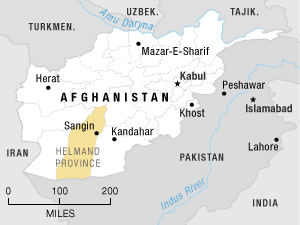 This past week, All Things Considered has been sharing stories about the Darkhorse Battalion –
that’s the Marine unit that suffered the highest casualty rate of any Marine unit during the 10-year Afghan
war. NPR Pentagon correspondent Tom Bowman wraps up the series today, as he tells weekends on All Things
Considered guest host Laura Sullivan about some of the people he met – both on the battlefield and on the home
front. Here are the names of the fallen from the Darkhorse Battalion. Most were in their twenties. Oct. 8,
2010: Lance Cpl. John Sparks Oct. 13, 2010: Lance Cpl. Joseph Rodewald, Lance Cpl. Phillip Vinnedge, Cpl.
Justin Cain and Pfc. Victor Dew Oct. 14, 2010: Lance Cpl. Alec Catherwood, Lance Cpl. Irvin Ceniceros and
Lance Cpl. Joseph Lopez Oct. 15, 2010: Lance Cpl. James Boelk Oct. 16, 2010: Sgt. Ian Tawney Nov. 4, 2010:
Lance Cpl. Matthew Broehm and Lance Cpl. Brandon Pearson Nov. 6, 2010: Lance Cpl. Randy Braggs Nov. 9, 2010:
1st Lt. Robert Kelly Nov. 10, 2010: Lance Cpl. James Stack
This past week, All Things Considered has been sharing stories about the Darkhorse Battalion –
that’s the Marine unit that suffered the highest casualty rate of any Marine unit during the 10-year Afghan
war. NPR Pentagon correspondent Tom Bowman wraps up the series today, as he tells weekends on All Things
Considered guest host Laura Sullivan about some of the people he met – both on the battlefield and on the home
front. Here are the names of the fallen from the Darkhorse Battalion. Most were in their twenties. Oct. 8,
2010: Lance Cpl. John Sparks Oct. 13, 2010: Lance Cpl. Joseph Rodewald, Lance Cpl. Phillip Vinnedge, Cpl.
Justin Cain and Pfc. Victor Dew Oct. 14, 2010: Lance Cpl. Alec Catherwood, Lance Cpl. Irvin Ceniceros and
Lance Cpl. Joseph Lopez Oct. 15, 2010: Lance Cpl. James Boelk Oct. 16, 2010: Sgt. Ian Tawney Nov. 4, 2010:
Lance Cpl. Matthew Broehm and Lance Cpl. Brandon Pearson Nov. 6, 2010: Lance Cpl. Randy Braggs Nov. 9, 2010:
1st Lt. Robert Kelly Nov. 10, 2010: Lance Cpl. James Stack
